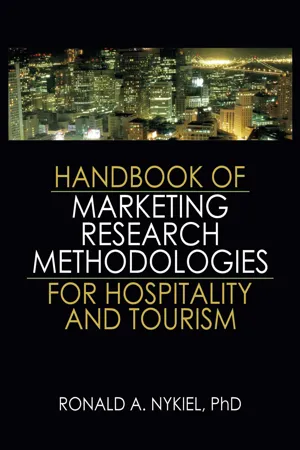Marketing
Research Instrument
A research instrument in marketing refers to the tools or techniques used to collect data for analysis. This can include surveys, questionnaires, interviews, and observation methods. The choice of research instrument depends on the specific research objectives and the type of data needed to make informed marketing decisions.
Written by Perlego with AI-assistance
Related key terms
1 of 5
3 Key excerpts on "Research Instrument"
- eBook - PDF
- James B. Schreiber, Kimberly Asner-Self(Authors)
- 2011(Publication Date)
- Wiley(Publisher)
These questions are often formatted to have a range of agreeability options—that is, how much you agree or disagree. In several instances, researchers are interested in whether you endorse or do not endorse an idea even when ‘‘agree and disagree’’ language is used. For example: 126 Chapter 6 • Instruments and Collection The federal government interferes in my daily life too much. ◦ Strongly Agree ◦ Agree ◦ Disagree ◦ Strongly Disagree Cable television is just having to pay to watch commercials. ◦ Strongly Agree ◦ Agree ◦ Disagree ◦ Strongly Disagree BASICS OF INSTRUMENT CONSTRUCTION Instrument, questionnaire , and survey appear to us to be used interchangeably in the literature and we are guilty of this. Specifically, an instrument is anything used to collect data. You could be the instrument through observing and memorizing what is occurring or through writing information down on note cards or field notes. Or you could be administering a test or survey, or having students use personal digital assistants (PDAs). A telephone interview protocol is also a type of instrument. Video recorders, tape machines, and digital video recorders can be data collection instruments. Questionnaires are a type of instrument for collecting data where the goal is to look for differences—that is, variability —in responses across groups of people. If everyone had the same response, or you believed they would, there is no reason to collect the data. Surveys, such as a population census, are designed for descriptive purposes—to observe the current state of the phenomenon. On a questionnaire you can ask a variety of questions or have participants reading your instrument reply or react to statements. For example: A. Do you believe that facts do not change over time? versus B. Facts are unchanging. 1 = Agree; 2 = Somewhat Agree; 3 = Somewhat Disagree; 4 = Disagree The question or statement can be considered open ended or close ended. - Ronald A. Nykiel(Author)
- 2007(Publication Date)
- Routledge(Publisher)
PURPOSE Marketing research is the active process of identifying and gathering information pertinent to assisting in the decision-making process. The type of information gathered for analysis is de- pendent upon the purpose of the research. In addition there are a variety of research methodolo- gies and information-gathering processes utilized by market researchers. One definition of marketing research is that it is the “function that links the consumer, customer, and public to the marketer through marketing information.” 1 * However, this is but one of many different defini- tions. Frequently, businesses want to know what the market for a specific product is or service before it can be sold to the consumer. And, frequently the term market research is used to de- scribe the process of identifying and gathering information related to the specific product or ser- vice. In this latter case the focus is on consumer demand, product and/or service supply, the present and future scenarios, and many other factors that can impact the decision process. Again, the type of information gathered for analysis is dependent upon the purpose of the re- search. The purpose of the research can be focused on analyzing customer needs, product/service at- tributes, competitors’ strengths and weaknesses, and even external events likely to impact the product or service offering. The research might focus on the product/service offering in terms of supply and demand, both current and future. The research may focus on actual markets, coun- tries, and cities, seeking to identify opportunities for or threats to an existing product/service offering. Research may focus on new product/service development by identifying market seg- ments or product/service offerings currently not being served. Handbook of Marketing Research Methodologies for Hospitality and Tourism © 2007 by The Haworth Press, Inc.- eBook - PDF
- Sharma, Premjit(Authors)
- 2021(Publication Date)
- Genetech(Publisher)
He/she may even specify the research problem in a way that biases the results towards a positive answer, e.g. “Your job is to find out how big the market might be for this product”. In reality, the task is to determine whether This ebook is exclusively for this university only. Cannot be resold/distributed. or not, there is a market for product X. The marketing researcher has to resist the pressures to simply confirm the prejudices of the person who has commissioned the study. The marketing researcher’s task goes beyond the collecting of data. He/she must also interpret it in terms of what the data means to the organisation which commissioned the research. Knowing that sixty percent of those interviewed thought that product A was superior to product B is, in its self, of little value. The organisation needs to know the alternative ways it can respond to this data. Data is equivalent to the raw materials of manufacturing it has to be converted to information before it becomes useful in decision making. The process of converting data into information is achieved through analysis. Whilst there is a need for accuracy, precision and thoroughness in marketing research it is to be remembered that, in practice, there is a perpetual conflict between the demands of expediency and the search for truth. The reality is that management is frequently under pressure to make timely decisions. Therefore management often seeks answers through marketing research in the shortest time possible and moreover, at minimum cost. On such occasions its methods tend to be less theoretically rigorous and its analysis more superficial. Marketing research can be concerned with any of a variety of aspects of the market; the product, sales, buyer behaviour, promotion, distribution, pricing, packaging etc. Since the researcher cannot investigate everything about a market, he/she must be selective.
Index pages curate the most relevant extracts from our library of academic textbooks. They’ve been created using an in-house natural language model (NLM), each adding context and meaning to key research topics.


